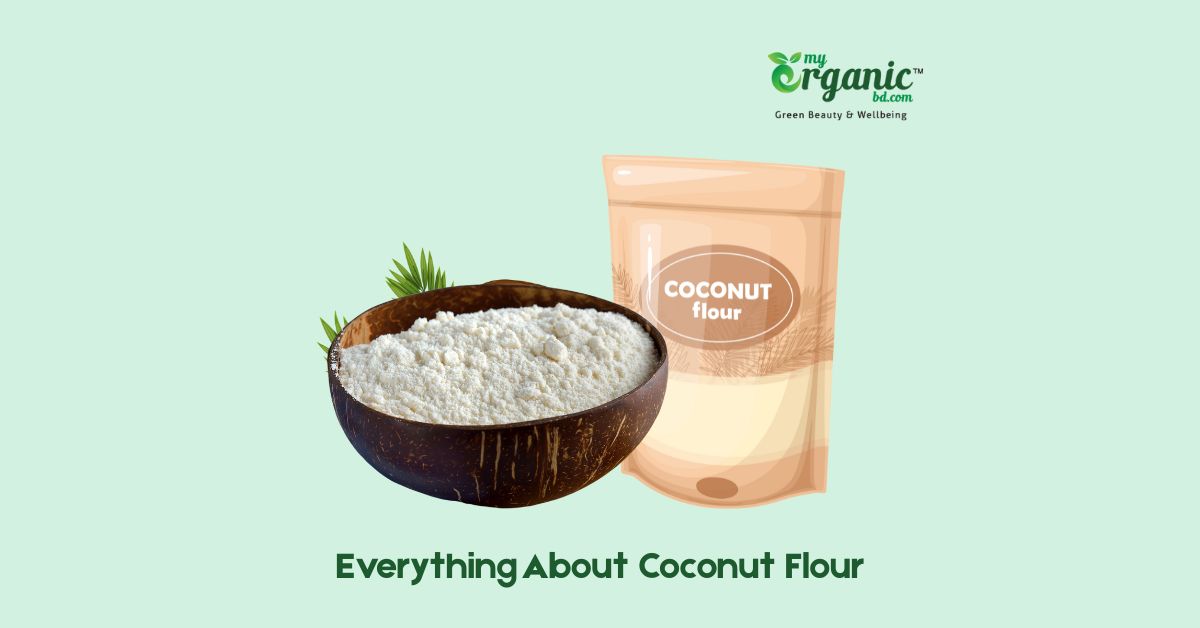Coconut flour is a healthier alternative to wheat and rice flour. It provides similar calories while containing more fiber, potassium, and protein. It is also free from gluten content. It is also way more sustainable than regular flour. It is often regarded as a superfood. However, we have a slightly different perspective that we will share in this article.
Meet the writers. We are Team My Organic Body & Diet (MyOrganicBD). We are a group of wellness coaches, nutritionists, food microbiologists, and doctors working together to produce the most reliable and easy-to-grasp content on organic food and lifestyle. With our years of experience in this industry, we offer the insights that you are looking for.
In this article, we will dive deep into different aspects of coconut flour. This will include history, how is it made, benefits, drawbacks, uses, etc. In the latter part, we will also discuss its potential in the future on wellness industry.
Let’s start!
Is Coconut Flour a Superfood?
If we compare it with other superfoods we have talked about, coconut flour is slightly less impressive. But it passes the minimum requirements to call it as a superfood. For convenience, we made a criterion to find out if a food can be called a superfood or not. There are 3 types of superfoods. The first superfood with diverse nutrients, a second superfood with an abundance of rare nutrients, and finally, a superfood with special abilities.
If we analyze coconut flour in that context, it is high in fiber, which is not rare but an important one. It also have the ability to lower blood sugar, contains low carbs, and is good for digestive and heart health. Considering all this, we have no problem terming it as a superfood.
There can be another perspective. If we look at the types of flour, such as white flour, brown flour, rice flour, and others, coconut flour has the most health potential and the fewest drawbacks. In that sense, it may get more priority. We like to call it super flour!

History of Coconut Flour
Coconut flour originated in Southeast Asia, where coconut is one of the most important crops. There is no solid historical evidence that suggests coconut flour was used in ancient times. Coconut flour is a byproduct of coconut milk and oil. As those products were used for thousands of years, coconut flour may also have been used in old times. It became a popular food in the Philippines, Malaysia, New Zealand, and many other countries where the coconut has been grown for a long time. Due to the revolution of new diet plans, especially the diet with low gluten and grain, coconut flour has received massive attention. Due to its popularity, it is found in almost every supermarket and similar store. This is good for the environment, as only a few percentage of leftover coconut pulp is used. They are often discarded after getting the oil and milk.
How is Coconut Flour Made?
Coconut flour is made from ground coconut flesh. First, the coconut flesh is scraped out, and then it is smashed and squeezed with a machine to bring out all the liquid extract of the coconut. Once the moisture is out, it is baked at a low heat to dry. After it is dried, coconut pulp is ground finely with a machine that provides it flour-like appearance.
Physical Characteristics of Coconut Flour
Coconut flour acts pretty differently from regular flour. It has a slightly coarser nature. It is heavier and may come with a slight grittiness. If you expect to cook it like regular flour, there is a high chance of making mistakes. In practice, ⅓ cup of coconut flour is similar to 1 cup of regular flour. It absorbs more water and expands. So you need less flour for your DIY cooking. We suggest following some detailed recipes first to get used to their nature.
Nutritional Facts
Here are the nutritional profiles of 28 grams or one cup of coconut flour—
Calories: 120
Carbohydrates: 18 grams
Sugar: 6 grams
Fiber: 10 grams
Protein: 6 grams
Fat: 3 grams
Iron: 11% of the Daily Value (DV)
Potassium: 13% of the DV
Let’s analyze the nutritional profile first. It comes with 120 calories, which is about 20% more than regular wheat flour. However, as coconut flour is usually consumed less, it balances perfectly.
Coconut flour has 18 grams of carbohydrates, 6 grams of which are sugar. However, due to its high fiber content (6 grams), the negative effects of carbohydrates are neutralized.
It has more than double the amount of protein compared to regular wheat flour. It also contains a good amount of Iron and Potassium. Iron is an essential mineral for oxygen transportation, immunity, and hemoglobin production. Potassium is important for fluid balance, heart health, muscle contraction, and nerve health. It also has a role in limiting blood sugar. Let’s discuss the benefits widely in the next section.
What are the Benefits of Coconut Flour?
There are several great benefits of coconut flour, and a few of them have good importance in countering modern health problems. Here are the main points of coconut flour—
Gluten-Free
Pure coconut flour does not contain any gluten. Glutens are the proteins found in the grains. It has the potential to cause autoimmune disease, digestive issues, celiac disease, etc. Coconut flour is completely free from those problems. Consuming gluten-free food is generally better for wellness. But make sure that the coconut flour you are buying is authentic & without any added ingredients.
Blood Sugar Regulation
Coconut flour has a naturally low glycemic index of 51. That means it lowers the amount of sugar in the blood. The high fiber is directly involved in the benefits. Fiber moderates the insulin release and minimizes the sugar spike in the blood. Coconut flour has about 4 times more fiber than regular flour.
Improve Digestion and Gut Health
The fiber of coconut flour can play a good role in the well-being of your digestive system. Fiber adds mass to the stool. It is good for the inner wall of our intestine. A healthy diet with enough fiber is required for a healthy community of gut bacteria. Gut bacteria help with better nutrient absorption and a healthy gut. It may have effects on our good mood and wellness. Our gut is directly connected to our brain.
Heart health
According to research, eating coconut flour may help reduce bad cholesterol or LDL. High fiber content may cause the effect. Coconut flour also contains potassium, which is essential for heart health. It reduce the risk factors of heart disease. Potassium also works to maintain blood pressure and blood sugar. However, for optimal cardiovascular benefits, coconut flour should be part of a heart-healthy diet that includes a variety of nutrient-dense foods, such as fruits and vegetables. There is some good evidence, but more research is needed in this area.
you can read the basics of healthy diet – Benefits & Tips.
Weight loss
If you are willing to lose some weight, this super flour may help you on the journey. It is high in fiber and has a slow metabolism rate. Once you eat coconut flour food, it will keep you full for longer than other foods. Research suggests food with high protein and fat may help to lose weight. But, this flour alone will not be effective. It should be a part of a proper diet and lifestyle. Consult a nutritionist to discuss your personalized diet plan.
Anti-inflammatory
Coconut flour contains lauric acid, which has anti-inflammatory effects and antimicrobial effects. Lauric acid breaks down to monolaurin, which blocks the inflammation pathways caused by bacteria or viruses. It can help with the common cold and similar sicknesses. It also reduces oxidative stress and potentially reduces oxidative stress.

What are the Disadvantages?
Coconut flour may have a few disadvantages that need to be addressed. It contains salicylates, which are a group of plant molecules that have the potential to cause salicylate intolerance. Not all people are intolerant to it, but some people might develop this condition. It can cause respiratory and digestive system discomfort & allergic.
The high fiber content of coconut flour may cause gas, bloating, and digestive issues for few people. People with sensitive digestive systems are more prone to this condition. Eating in moderation can solve the issue for most.
Aside from potential health drawbacks, there are a few others. Coconut flour is super dry, it absorbs and expands a lot. This may surprise even experienced cook. Due to its high tendency to absorb moisture, might absorb humidity from the air if not stored properly. Always use an airtight container to store this flour.
What are the Uses of Coconut Flour?
When it comes to uses of this super flour, it mostly used like regular flour. You can make coconut flour bread, cake, muffins, and pancakes. It can be a gluten-free and healthier alternative to wheat flour-made bakery products. But this flour have a slightly mild flavor of coconut. This may not be pleasant for everyone. However, you can easily mask it with a strong flavor like chocolate.
Coconut flour can also be used as a thickening agent in sauce, soup, and gravy. This flour is moderately versatile, so you can easily be creative with it. But before experimenting, make sure to understand its nature.
Taste
Coconut flour comes with a mild flavor of nut and coconut with a hint of sweetness. It will suit nicely in some dishes, but certainly not all. Bananas, chocolate, or some other strong flavor can be used to mask the flavor of coconut.
Natural Coconut Flour in the Wellness Industry?
This Natural flour has some good benefits in the wellness industry. In the flour niche, there are not many healthy ones. Most regular flours have some issues. They are not very nutritious either. There are some special ones like almond flour, but that is high in energy and fat. So, coconut flour is a more reliable option for most health-conscious people. This flour is already very popular and now available almost everywhere. Coconut flour peaked in popularity in 2020; after that, the trend faded. But a large number of people consistently started using this amazing flour. Depending on our current research, this super flour is not likely to lose its popularity anytime soon.
You should also read the Benefits of Coconut – A complete guide for wellness.

Future of Coconut Flour in Human Civilization
In the future, the use of coconut flour may expand. But in the past 4 years, we noticed a very consistent line of interest in Google Trends. If another trend gets triggered, it will surely see a rise in use. Compared to other types of flour, this flour is better in so many ways. But it also has some limitations, such as it’s not easy to use. It is hard to say the new innovation in future on this. But it’s certain that there will always some people who would choose this amazing flour above other types.
FAQ
Why does my stomach hurt after eating coconut flour?
This can be the high fiber content that your sensitive digestive system could not process properly. It can also be for coconut allergy. Try eating a mild amount if the problem recurs. This flour may not be for you. Consult your nutritionist is recommended.
Which is healthier – Coconut or almond flour?
Coconut is slightly healthier, especially if you are looking to lose weight, manage blood sugar, and improve heart health.
Why do I feel weird after eating coconut flour?
It can be the result of a coconut allergy or digestive discomfort. Get suggestions from your dietician.
Is coconut flour IBS-friendly?
This flour may not be suitable for people with irritable bowel syndrome (IBS). People with IBS have a weaker digestive system, which may worsen the syndrome.
Is coconut flour an anti-inflammatory food?
Yes, coconut flour has anti-inflammatory properties due to its lauric acid content. But the effects may not be as effective as some other anti-inflammatory foods.
What is the lowest-carb flour?
Coconut flour has the lowest carb among the flours that can be used for baking. But in a real sense, it is psyllium flour.
Is coconut fiber diabetic-friendly?
Yes, coconut flour is friendly for diabetic patients. It has a low GI score of 53, plus it has a high amount of fiber and potassium. Those can be really beneficial for keeping the blood sugar in control.
Can you replace all-purpose flour with coconut flour?
Yes, you can use coconut flour as an all-purpose flour. Need to get used to first.
Conclusion
This super flour is a special organic flour, considering its unique benefits and versatility. It offers some of the benefits that no other flour can offer similarly. As chronic diseases are increasing worldwide, people are becoming more health-conscious than ever natural food like coconut flour will gain priority.
Read Organic Food for a Healthier Lifestyle to get a clear view.
Mr. Shariful Alam Pavel believes in natural living. To live a healthy conscious living, we need to eat green, live green. MyOrganic Bd is a green wellbeing brand, educating millions to live a better life with mother nature.
- Shariful Alamhttps://myorganicbd.com/author/sharif/
- Shariful Alamhttps://myorganicbd.com/author/sharif/
- Shariful Alamhttps://myorganicbd.com/author/sharif/
- Shariful Alamhttps://myorganicbd.com/author/sharif/
Dr. Goutom Banik, MBBS, MPH, is a public health researcher with extensive experience in maternal, newborn, and child health, including nutrition interventions in underserved communities. He has worked with leading organizations such as Save the Children and icddrb, contributing to national strategies on child health and nutrition. His expertise spans operational research, health systems strengthening, and community-based programs addressing childhood illness.
- Dr Goutomhttps://myorganicbd.com/author/dr-goutom-banik/
- Dr Goutomhttps://myorganicbd.com/author/dr-goutom-banik/
- Dr Goutomhttps://myorganicbd.com/author/dr-goutom-banik/
- Dr Goutomhttps://myorganicbd.com/author/dr-goutom-banik/






